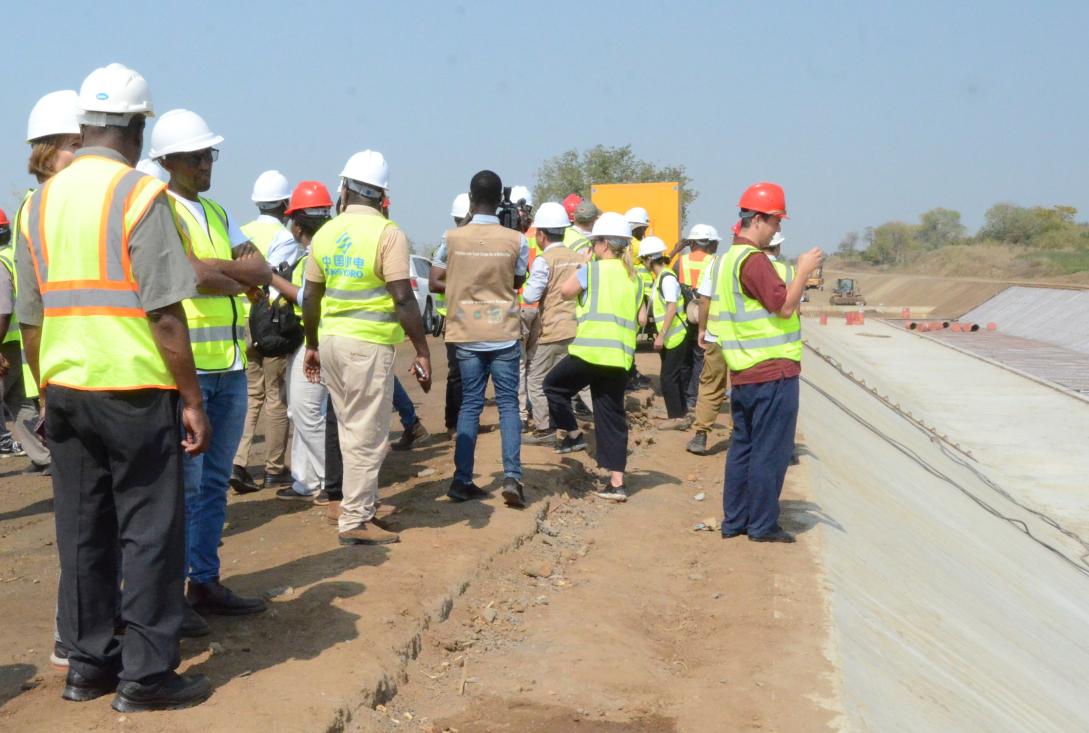Development Partners conduct a Field Visit to Shire Valley Transformation Programme in Chikwawa

SVTP is jointly financed by the World Bank, AfDB, IDA, OFID, GEF and Malawi Government for a total budget of about US$519 million (US$234 million for phase I and US$285 million for phase II).
The SVTP vision is to shift subsistence drought prone smallholder farming to irrigated all-year round commercial farming. Twelve donor agencies under DCAFS joined the field visit and these were the European Delegation, the World Bank, FCDO, IFAD, the German Embassy, the Japanese Embassy, the Flanders Government of Belgium, the Royal Norwegian Embassy, the Embassy of Ireland, the UN Food and Agriculture Organization, the UN World Food Program and the International Food Policy Research Institute (IFPRI). The Donors were also joined by Government officials including the Director of Irrigation Development in the Ministry of Agriculture.
The donors visited the main canal, starting with Intake, then Tiger Fish Barrier, Siphon 5, one off-take being constructed, the Main Canal bifurcation point, high embankment and Mwana-Alirenji Farmer Cooperative. The field visit is part of the Donor’s Retreat which aims to reflect on coordination, harmonization and alignment of programs with Government priorities.
Key Lessons from the Visit:
- The Shire Valley Transformation Programme is a game changer in agriculture productivity and commercialization with a strategic commercial farming model for targeted households in the Shire Valley. SVTP identifies high-value crops for production (cotton, soya beans and bird-eye chilli), market linkages by identifying off-takers from the business planning stage.
- The field visit gave the Donors an opportunity to engage farmers on how they address customary land registration issues to ensure sustainable irrigation schemes. The Donors were impressed that land demarcation and registration by the Ministry of Lands in tandem with the Land Laws (2022 Amendment) is a milestone in addressing the common land conflicts which affect the sustainability of irrigation schemes.
- Donors were impressed with the good progress despite the effects of Cyclone Anna in January 2022 which affected infrastructure at Main Canal. The plan is to irrigate 904 hectares by end of 2024 for 1,244 land owners, a start of mega irrigation in Malawi. On intake canal construction, 96% of the first 6 kilometres stretch canal has been completed thus far.
- The Donors applauded smallholder-led commercial farmers for their commitment to make a required minimum financial contribution of up to 35% to the project budget. This signifies an obligation to farming business ownership. However, Donors noted that there is an urgent need for the farmer cooperatives to swiftly establish binding partnerships with financial institutions to access finance and make their timely contributions. For example, one model cooperative, Mwana-Alirenji presented its cooperative structure and business plan worth K14 billion. The cooperative needs to raise K4 billion contribution to start irrigation works in the coming months.
- The District Commissioner for Chikwawa District Assembly, Mr Nardin Kamba assured Donors that the assembly is committed to supporting the SVTP because it is a milestone in the economic development of the district. The District Commissioner pointed out that immediate gains from the project include employment creation and capacity building of farmer cooperatives which has triggered the commercialization of farming as well as growing business opportunities.
- The SVTP Team Leader from the World Bank, Mr Time Fatch, underscored the Donor commitment to harmonized financing of programs to ensure value for money. He encouraged all Donors to consider co-financing SVTP, especially in strategic components such as land development so that crop production can start immediately after water flow in the canals is opened.





